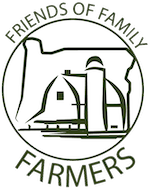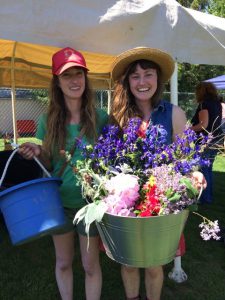What gnaws at us all is the regret of an unlived life. We have every opportunity and ability to pursue our passions to the fullest, but too often fall victim to procrastination. It affects us all, some of us it cripples. Those who do wake each morning and do exactly what they want are envied, glorified, even studied. But they are merely doing what they love. The world is a better place when someone finds that which keeps them up each night and rouses them from bed every morning.
For local long-stem flower farmers Lindsay Goldberg and Courtney Brooks—owners of Fawn Lily Farm—finding time for such contemplations may be difficult. The native California gals recently begin their second year as Oregonians and their second season as professional flower farmers. Within mere months, the flower duo was able to turn an idea hatched in a California craft fair into a viable and profitable flower and herb farm in the green hills of Corbett, OR.
With no business plan, no long-stem flower experience and no connections, the peddlers moved to Oregon and began what they call their grand experiment: learning how to run a small business while dealing with the setbacks and self doubt associated with mastering a new skill. They are farming a half acre with a hoop house on a 20-acre plot, most of which is forested.
The Fawn Lily women’s growing process is centered on locally-adapted, open pollinated, pesticide-free growing. These practices suit the owners of the land, Michael and Pam, just fine– they had been looking someone with a similar ethos for some time. The group was brought together with the help of iFarm Oregon—a program created by non-profit Friends of Family Farmers—which links those who have land with those that need it.
Lindsay greets me with hands so muddy she’s forced to withdraw once she notices my city boy mitts. Pam the owner is out chatting and welcomes with a smile as well. It’s a little cold and rainy but dry in the hoop house where seed sowing is all the rage. Courtney is just finishing parking her sedan. Although they are at the start of their flower careers, the women carry themselves as if they had worked the ground for years. At one point, I’m given a pep talk as I admit my own unfulfilled aspiration of raising grass-fed cows some day. They seem confused by my procrastination. Courtney ends with, “You’re not dead yet.”
I am not dead, but there is no certainty that I’ll even finish writing this profile, let alone start a cattle operation. Fawn Lily, in their first year was selling flowers in New Seasons. They gained favor of New Seasons’ buying manger as they left her message everyday until “she eventually replied with, ‘How many of you are there?” Fawn Lily’s blooms showed up in a few stores last year and will be in more store locations in 2016.
As I chat with Pam and the Fawn Lily crew it’s easy to see how such as casual arrangement can work. “We had two guys here for six years that worked our place and took great care of it,” Pam tells me, “but we had been looking for someone else since 2000.” Courtney and Lindsay on the other hand traded only 5 or so emails with landowners on iFarm before getting an instant reply from Pam. The arrangement seems to be a good fit. “We didn’t have a lot of capital and we’re not builders,” Lindsay explains, “so some [existing] infrastructure was important.”
An accomplishment of note is their recent inclusion in the Portland Flower Market, which is Portland’s wholesale “farmer-to-florist” market. This move will give Fawn Lily’s product constant exposure to buyers in a very competitive field. “We have to specialize in a niche that the fresh cut flower industry can’t provide. [We] try to get people to think about the idea of slow flowers, that origin matters, and the true cost of flowers.” Courtney also mentions that it is nice to not to have to be at the Portland Flower Market in person in order to sell their goods.
The new Oregonians have adapted well to their surroundings. Despite not knowing a soul upon arrival, they now credit much of their success to the community of small farmers they’ve a made a point to join. They both feel that having a mentor would have made things smoother, but they have received lots of help from fellow sod busters. “That’s what keeps us going. Everyone is in it to help out. Everyone is transparent. People are even willing to share their spreadsheets,” says Lindsay. “We cleaned the guy’s house right up here,” Courtney adds pointing toward Mt. Hood, “in exchange for tilling our field.”
It’s not easy to find one’s life task, let alone have the courage to pursue it. Courtney and Lindsay created Fawn Lily Farm through action and acceptance of the unknown. A good lesson for us all: always listen to that voice in your head. She ain’t always right, but she’s never boring.
by Coby Harrod, FoFF volunteer

